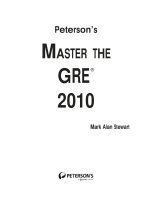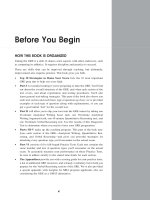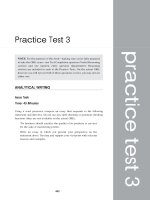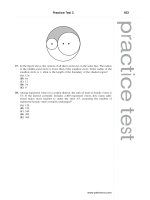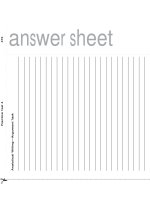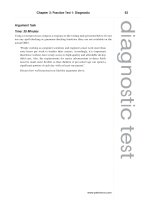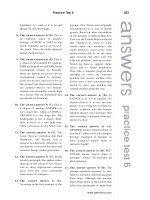The gre quatitative section 2 docx
Bạn đang xem bản rút gọn của tài liệu. Xem và tải ngay bản đầy đủ của tài liệu tại đây (130.53 KB, 6 trang )
■
In a square, diagonals have both the same length and intersect at 90-degree angles.
Solid Figures, Perimeter, and Area
You will need to know some basic formulas for finding area, perimeter, and volume on the GRE. It is impor-
tant that you can recognize the figures by their names and understand when to use which formula. To begin,
it is necessary to explain five kinds of measurement:
P
ERIMETER
The perimeter of an object is simply the sum of the lengths of all its sides.
6
7
4
10
Perimeter = 6 + 7 + 4 + 10 = 27
B
C
A
D
AC = DB
and
AC DB
B
C
A
D
BD AC
– THE GRE QUANTITATIVE SECTION–
195
AREA
Area is the space inside of the lines defining the shape.
You will need to know how to find the area of several geometric shapes and figures. The formulas needed
for each are listed here:
■
To find the area of a triangle, use the formula A =
ᎏ
1
2
ᎏ
bh.
■
To find the area of a circle, use the formula A =
r
2
.
■
To find the area of a parallelogram, use the formula A = bh.
■
To find the area of a rectangle, use the formula A = lw.
■
To find the area of a square, use the formula A = s
2
or A =
ᎏ
1
2
ᎏ
d
2
.
w
l
h
b
r
h
b
= Area
– THE GRE QUANTITATIVE SECTION–
196
■
To find the area of a trapezoid, use the formula A =
ᎏ
1
2
ᎏ
(b
1
+ b
2
)h.
V
OLUME
Volume is a measurement of a three-dimensional object such as a cube or a rectangular solid.An easy way to envi-
sion volume is to think about filling an object with water.The volume measures how much water can fit inside.
■
To find the volume of a rectangular solid, use the formula V = lwh.
■
To find the volume of a cube, use the formula V = e
3
.
e
e = edge
width
length
height
h
b
1
b
2
d
s
s
s
s
– THE GRE QUANTITATIVE SECTION–
197
■
To find the volume of a cylinder, use the formula V =
r
2
h.
SURFACE
AREA
The surface area of an object measures the combined area of each of its faces. The total surface area of a rec-
tangular solid is double the sum of the area of the three different faces. For a cube, simply multiply the sur-
face area of one of its sides by 6.
■
To find the surface area of a rectangular solid, use the formula A = 2(lw ϩ lh ϩ wh).
■
To find the surface area of a cube, use the formula A = 6e
2
.
e
e = edge
V = lwh
width
length
height
4
4
Surface area of front side = 16.
Therefore, the surface area
of the cube = 16 ϫ 6 = 96.
r
h
– THE GRE QUANTITATIVE SECTION–
198
■
To find the surface area of a right circular cylinder, use the formula A = 2
r
2
+ 2
rh.
CIRCUMFERENCE
Circumference is the measure of the distance around a circle.
■
To find the circumference of a circle, use the formula C = 2
r.
Coordinate Geometry
Coordinate geometry is a form of geometrical operations in relation to a coordinate plane. A coordinate plane
is a grid of square boxes divided into four quadrants by both a horizontal (x) and vertical (y) axis. These two
axes intersect at one coordinate point—(0,0)—the origin. A coordinate pair, also called an ordered pair, is a
specific point on the coordinate plane with the first number representing the horizontal placement and sec-
ond number representing the vertical. Coordinate points are given in the form of (x,y).
GRAPHING ORDERED PAIRS
To graph ordered pairs, follow these guidelines:
■
The x-coordinate is listed first in the ordered pair and tells you how many units to move either to the
left or to the right. If the x-coordinate is positive, move to the right. If the x-coordinate is negative,
move to the left.
■
The y-coordinate is listed second and tells you how many units to move up or down. If the y-coordinate
is positive, move up. If the y-coordinate is negative, move down.
Example:
Graph the following points: (–2,3), (2,3), (3,–2), and (–3,–2).
Circumference
– THE GRE QUANTITATIVE SECTION–
199
■
Notice that the graph is broken into four quadrants with one point plotted in each one. Here is a chart
to indicate which quadrants contain which ordered pairs, based on their signs:
LENGTHS OF HORIZONTAL AND VERTICAL SEGMENTS
Two points with the same y-coordinate lie on the same horizontal line, and two points with the same
x-coordinate lie on the same vertical line. Find the distance between a horizontal or vertical segment by
taking the absolute value of the difference of the two points.
Example:
Find the length of the line segment AB and the line segment BC.
Points
Sign of
Coordinates
Quadrant
(2,3)
(–2,3)
(–3,–2)
(3,–2)
(+,+)
(–,+)
(–,–)
(+,–)
I
II
III
IV
II
I
III IV
(−2,3) (2,3)
(−3,−2)
(3,−2)
– THE GRE QUANTITATIVE SECTION–
200


